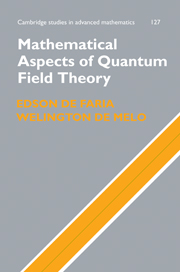Book contents
- Frontmatter
- Contents
- Foreword
- Preface
- 1 Classical mechanics
- 2 Quantum mechanics
- 3 Relativity, the Lorentz group, and Dirac's equation
- 4 Fiber bundles, connections, and representations
- 5 Classical field theory
- 6 Quantization of classical fields
- 7 Perturbative quantum field theory
- 8 Renormalization
- 9 The Standard Model
- Appendix A Hilbert spaces and operators
- Appendix B C* algebras and spectral theory
- Bibliography
- Index
8 - Renormalization
Published online by Cambridge University Press: 05 March 2013
- Frontmatter
- Contents
- Foreword
- Preface
- 1 Classical mechanics
- 2 Quantum mechanics
- 3 Relativity, the Lorentz group, and Dirac's equation
- 4 Fiber bundles, connections, and representations
- 5 Classical field theory
- 6 Quantization of classical fields
- 7 Perturbative quantum field theory
- 8 Renormalization
- 9 The Standard Model
- Appendix A Hilbert spaces and operators
- Appendix B C* algebras and spectral theory
- Bibliography
- Index
Summary
We saw in Chapter 3 that, when attempting to construct a relativistic quantum theory of particles, Dirac and others realized that the number of particles in the system could not be taken to be constant, because new particles are constantly created and also destroyed. The solution to this problem was to develop instead a relativistic quantum theory of fields, because a field corresponds already to infinitely many particles. However, for many years there were serious doubts in the physical community concerning the foundations of this theory because, as we have seen, many of the calculations done in the perturbative theory give rise to infinities. The situation changed completely in the late 1940s when Feynman, Schwinger, Tomonaga, Dyson, and others developed a procedure to remove these infinities from the calculations, and the finite results obtained had an impressive agreement with experiment. The idea of renormalization was born. For this discovery, the first three shared the Nobel prize in 1965. In the early 1970s a new breakthrough was achieved when t'Hooft and Veltman proved the renormalizability of gauge theories (Nobel Prize 1999). Finally Wilson developed the concept of a renormalization group, related to critical phenomena connected with phase transitions. His ideas were later used in perturbative quantum field theory, as we will describe below, and also in constructive field theory. For these developments, Wilson received the Nobel prize in 1982.
- Type
- Chapter
- Information
- Mathematical Aspects of Quantum Field Theory , pp. 192 - 203Publisher: Cambridge University PressPrint publication year: 2010



